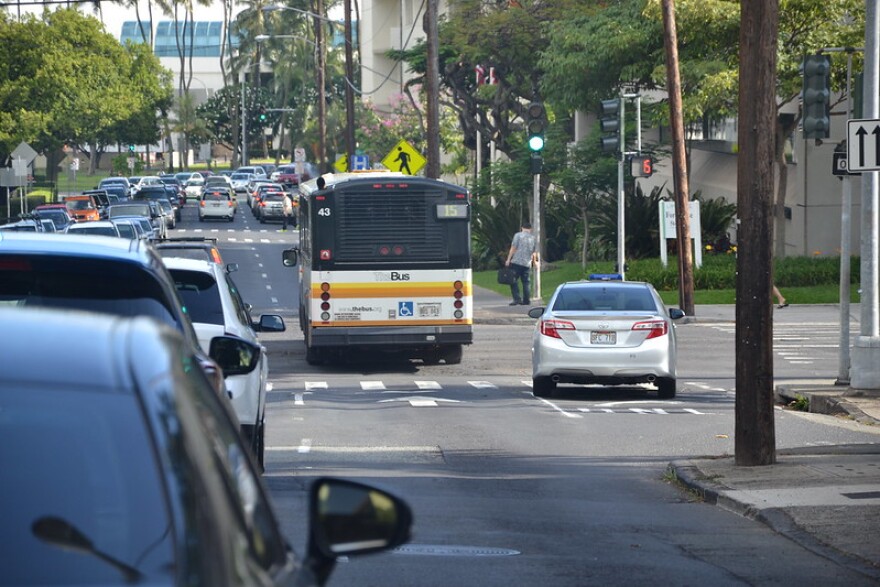The idea of a carbon tax has broad support from economists and a version was already approved by the state Senate. If agreed to by the House and Gov. David Ige, it would become the first measure of its kind in the U.S.
It’s rare to find anything that creates universal agreement in 2020. But University of Hawaii economics professor Michael Roberts says economists from across the political spectrum support a tax on carbon emissions.
“The essential idea is that pollution is bad for society and we don't pay for it. There's no price for pollution,” Roberts said, describing what economists call an externality.
Externalities occur when the true cost of a market activity is not reflected in the price of a particular product or service. They are most commonly thought of as negative, meaning the activity imposes some unpaid cost on society, as in the case of carbon emissions.
Roberts uses a car to illustrate the example of atmospheric carbon emissions.
“We pay for the gas, we pay for the car, and we pay for the insurance, but we don’t pay for pollution that comes out of the tail pipe.”
The idea of using taxes to address negative externalities like pollution has been around for decades.
Basic laws of supply and demand say that people will use less of something the more expensive it is. So a tax on carbon pollution will push people to burn fewer fossil fuels.
Roberts says not only would a carbon tax nudge individuals and businesses to reduce emissions, it would also accelerate the development of green technologies.
“It would really harness all aspects of our incredibly complex economy to deal with this problem,” he said.
Several versions of a carbon tax were proposed by state lawmakers in the 2020 legislative session. One authored by Honolulu state Sen. Karl Rhoads was just passed by the Senate.
The tax would be paid by wholesale distributors of fossil fuels, but could be passed on to retailers, utilities, and ultimately consumers.
Maui state Rep. Tina Wildberger authored one carbon tax proposal. The small business owner supports aggressive measures to reduce emissions, but says the idea of a carbon tax is appealing because it’s less disruptive than an outright ban.
“You can't just go in gangbusters and up end established economic structures without taking into account everything that's going to domino down the line,” she said in an interview.
One commonly cited domino effect from a carbon tax is that it disproportionately hurts low income residents. Tom Yamachika, president of the Tax Foundation of Hawaii, told HPR that taxes designed to change behavior are inherently regressive.
“No matter who you are, no matter how much you make . . . as long as you are using the thing that's the object of the tax, you got to pay it,” Yamachika said.
The current carbon tax proposal contains income-based tax credits to address that issue.
That raises the issue of whether or not a tax that is offset by a corresponding credit will actually produce a change in market behavior. Michael Roberts says the evidence suggests that income tax credits do not reliably change the actions of individuals, so the carbon tax would likely still have the desired effect.
However, there are yet other issues to consider in crafting a tax on emissions. Yamachika notes that taxes designed to reduce a certain market activity are not a reliable source of long-term revenue.
He uses the example of the state’s cigarette tax, similar in a nature to a carbon tax, which is used to fund the University of Hawaii’s cancer research center. Revenue from the cigarette tax has been declining since 2013, which has forced the University of Hawaii to request additional funding in the past.
Yamachika says lawmakers need to keep that in mind when deciding how to use revenue raised by any theoretical carbon tax.
“One of the goals of the tax is to be high enough to change people's behavior. And guess what? It's working. People are consuming less and so as a result, the amount of money that's going into the cancer center is going down,” Yamachika said.
Under the current proposal, revenue from the carbon tax passed by the Senate would be directed into six different special funds for purposes like energy security and environmental response. Yamachika would rather see that money go to the state’s general fund.
S.B. 3150, as the carbon tax bill is designated, now heads to the state House, which can make changes or kill the idea entirely.
Representatives have already declined to advance multiple carbon tax measures, including one put forward by Speaker of the House Scott Saiki.
If passed, Hawaii’s would be the first statewide carbon tax in the U.S.
No dollar figure for the tax has yet been specified in the current draft, which would take effect in 2021, with graduated increases every three years until 2030.



